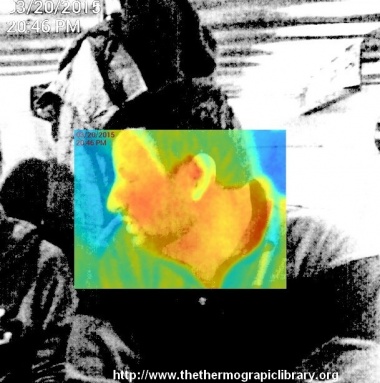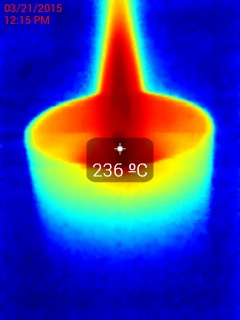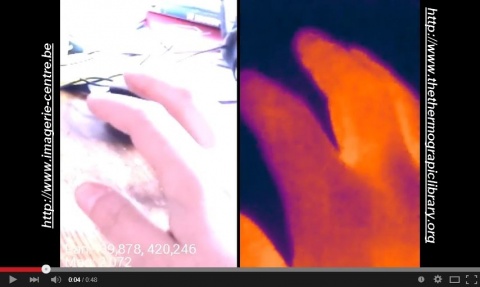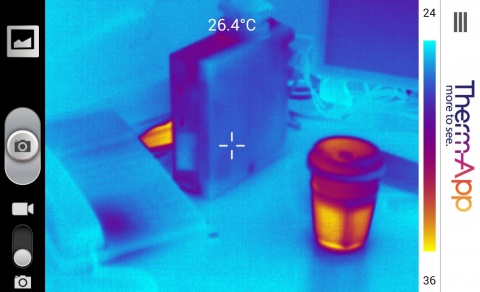Affichages
(→Medical application) |
|||
| (2 révisions intermédiaires par un utilisateur sont masquées) | |||
| Ligne 91 : | Ligne 91 : | ||
[[Fichier:Bougie-thermographie.jpg|240px|thermography of a candle with Seek thermal]] | [[Fichier:Bougie-thermographie.jpg|240px|thermography of a candle with Seek thermal]] | ||
[[Fichier:Feu-gaz-temperature-thermographie.jpg|560px|Digital/thermal view of a gas heating source thermal]] | [[Fichier:Feu-gaz-temperature-thermographie.jpg|560px|Digital/thermal view of a gas heating source thermal]] | ||
| + | |||
| + | |||
| + | ===Medical application=== | ||
| + | |||
| + | [http://www.humanvethermography.com/ Pr José Travassos Valdez] integrated this camera into his medical protocol previously with classical infrared camera. Despite a little additional manual operation, quality and efficiency of the device allows him to produce usable thermogram in order to diagnose patients. In addition, integration of the images from Seek thermal to his medical analysis software doesn't cause any problem. Then tomorrow, all doctors with a micro infrared camera into pocket? | ||
| + | |||
| + | [[Fichier:Medical-seek-xr-Valdez-thermography.jpg|560px|Medical exploitation of the Seek thermal XR by Pr José Travassos Valdez]] | ||
===Comparison Seek thermal XR vs FLIR E30bX=== | ===Comparison Seek thermal XR vs FLIR E30bX=== | ||
| Ligne 99 : | Ligne 106 : | ||
This FLIR model is highly used by building professisonal. | This FLIR model is highly used by building professisonal. | ||
| − | [[Fichier:Comparison-seek-thermal-flir-e30bx-thermography.jpg|Comparison of 2 thermal cameras , la professional FLIR E30bX and micro USB for smartphone Seek thermal XR]] | + | [[Fichier:Comparison-seek-thermal-flir-e30bx-thermography.jpg|560px|Comparison of 2 thermal cameras , la professional FLIR E30bX and micro USB for smartphone Seek thermal XR]] |
| Ligne 107 : | Ligne 114 : | ||
For temperature, min/max mode shows here his limit but on a difficult case but if we check the spots, FLIR see colder point 18°C in place of 20°C for the Seek and 45°C in place of 47°C for the maximum, question about emissivity is open then, the emissivity point of reference of the Seek is unknown. This demonstrates a problem with min/max betwen FLIR says 16.7°C minimum and 63.1°C for the maximum. Anyway, when checking the same spot location with both cameras, results are really very similar, this can be considered as an excellent result for a micro camera. | For temperature, min/max mode shows here his limit but on a difficult case but if we check the spots, FLIR see colder point 18°C in place of 20°C for the Seek and 45°C in place of 47°C for the maximum, question about emissivity is open then, the emissivity point of reference of the Seek is unknown. This demonstrates a problem with min/max betwen FLIR says 16.7°C minimum and 63.1°C for the maximum. Anyway, when checking the same spot location with both cameras, results are really very similar, this can be considered as an excellent result for a micro camera. | ||
| − | === | + | |
| + | ===Doubble vision digital/thermal=== | ||
| + | |||
| + | A duplicate simultaneous view is offered on the smarphone: | ||
| + | |||
| + | <imagemap> | ||
| + | image:Vue-double-video-thermographie-seek-thermal.JPG|480px|Extract of the doubble view video of a moving hand on a table | ||
| + | default [https://www.youtube.com/watch?v=o92KcT_8vzM YouTube] | ||
| + | desc top-left | ||
| + | </imagemap> | ||
| + | |||
| + | |||
| + | The screenshot upper is extracted from a video of a moving hand and deposit on a table for a thermal print. | ||
| + | |||
| + | |||
| + | |||
| + | Take care, doubble view exists for pictures and for video but for pictures, you will see half of each two pictures who will be saved, for video, you will see the entire unique document who will be recorded. | ||
| + | |||
| + | |||
| + | ===Price vs Quality=== | ||
Version actuelle en date du 24 novembre 2015 à 07:55
[modifier] Testing the Seek thermal USB camera
Version française: Test de la Seek thermal XR
Normally only available for North America, it was possible trasnfer one to Europe this new mini USB thermographic camera for smartphone Android or Iphone: the Seek thermal XR model.
Compacte, elle se branche sur le port USB inférieur de la majorité des téléphones des dernière génération de 2014 et 2015 avec une préférence pour les Samsun, HTC, Google phone et Motorola, globalement tous les Android tournant minimum Android 4.3 et iOS 7.0.
Really compact, you plug it directly on the USB portof most of the last 2014 and 2015 smartphone and running Android 4.3 and iOS 7.0, preferably with Samsung, HTC, Google Phone and Motorla (better top check compatibility's list on: http://www.thermal.com/supported).
Anyway, surf on Thermal + for more info).
But what could be the real quality of such mini USB camera?
[modifier] Technical specification Seek thermal XR PIR-206
- Field of view: 20° (scene one meter distance: 34.5*26.1 cm)
- Manual focus
- Résolution: 206 x 156 pixels (thermal image 624x832 pixels)
- IFOV estimated 1.7
- Minimum distance estimated: 10cm
- Range of temperature: -40°C to 330°C
- Temperature sensitivity: around 0.5°C (1°F)
- Thermal palette scheme: 9
- Vidéo: yes
- Isotherm: yes
- Emissivity regulation: no
- Temperature scale: no
- Thermal spot: yes (1) + min/max
- Therma range regulation: no
- Edit thermogram: no
- Zoom: no
- Separate digital view: yes
- Watermak: available for Seek copyright, date/time, location and temperature
- Frequency video < 9Hz
- Wavelegnht 7.2 – 13 µm
- Vanadium oxyde, uncooled microbolometer
- Lens in chalcogenide
- Size 45x20x15mm+objectif diameter 21 mm x10mm of lenght
- weight:14 grammes
- Magnesium Housing
- Protective Waterproof Case
[modifier] Demonstration in action
This is the observator view, Seek thermal is the little case plugged on the right.
[[Fichier:Tasses-seek-thermal.jpg|480px|Digital and thermal view of mugs]
Manual focus is not easy at the beginning and digital view is easily blurred if not attentive.
Clearness is satifactory but needing a little practise.
[modifier] Vidéo
Thermal video of a hand with Seek thermal
Thermal external inspection of a house with crowd
Thermal video of a group of people in black and white
Thermographic video of a burning sparkler
Conclusion: this camera seems having a precision around the half degree and is requesting minimally 5 degrees of thermal range to be efficient, black and white mode produces readable video, les easy when using other schemes.
[modifier] Thermal people
Thermal proof with people:
This demonstrates the real working of the tandem use digital/thermal but as this uses the smartphone's camera, difficult to use short range, below the meter because parallaxe exists causig gap between two images (but this is the case for all thermal camera, here distance between both are a bit higher as usual).
[modifier] Température's limit
This thermography of a candle shows a higher temperature arounf 236°C who's quite in the theoric range to be observed but thermal spot is really difficult to maintained due to smartphone shaking. Mode min/max is really unstable but demonstrates a better use on heavier source of heat on the second illustration (digital view extracted from the Thermal+ mode).
[modifier] Medical application
Pr José Travassos Valdez integrated this camera into his medical protocol previously with classical infrared camera. Despite a little additional manual operation, quality and efficiency of the device allows him to produce usable thermogram in order to diagnose patients. In addition, integration of the images from Seek thermal to his medical analysis software doesn't cause any problem. Then tomorrow, all doctors with a micro infrared camera into pocket?
[modifier] Comparison Seek thermal XR vs FLIR E30bX
The below comparison is quite unfair because using an office's lamp with incandescent lamp composed with a roounded metalic cover and with overheating slots, this means this target is a thermal nightmare because additionally the object is dirty with metallic and rounded effect. I put the Seek with min/max mode and with color scheme similar to the classical rainbow palette. On the opposite a FLIR E30bX will be used with emissivity to one, it is allowing 320X240 pixles, 0.1°C of thermal sensivity, 25° of view, manual focus, this one of the best equipment of FLIR as price choice but 3 years old technology.
This FLIR model is highly used by building professisonal.
Well, question of pixels as view of Seek is 20° and FLIR 25°, result is quite similar and except color scheme not the same, thermal signature is extremely similar, really astonishinf result.
For temperature, min/max mode shows here his limit but on a difficult case but if we check the spots, FLIR see colder point 18°C in place of 20°C for the Seek and 45°C in place of 47°C for the maximum, question about emissivity is open then, the emissivity point of reference of the Seek is unknown. This demonstrates a problem with min/max betwen FLIR says 16.7°C minimum and 63.1°C for the maximum. Anyway, when checking the same spot location with both cameras, results are really very similar, this can be considered as an excellent result for a micro camera.
[modifier] Doubble vision digital/thermal
A duplicate simultaneous view is offered on the smarphone:
The screenshot upper is extracted from a video of a moving hand and deposit on a table for a thermal print.
Take care, doubble view exists for pictures and for video but for pictures, you will see half of each two pictures who will be saved, for video, you will see the entire unique document who will be recorded.
[modifier] Price vs Quality
Globally, for 300$ but needing a superior smartphone, price is extremely attractive same if you must purchase a smartphone, this camera have most of the capacity of a standard thermal camera but with three main weak point: producing only thermal image and no editable thermogram, not possible to align temperature's range of observation and sensitivity of 1°C is a bit wild.
Optical with 20° is interesting because usually we stay at distance and isotherm is availalbe to hide undesired temperature's range, only pitty that no temperature's scale is available in watermark.
For the rest, people like plumber, real estate, heating engineer, ... who just need thermography time to time and/or with high difference of temperature would be very happy for the price and the quality. Expenrienced thermographs can have it just as safety device, to complete the temperature range, capacity to perform demonstration anywhere or simply exercising or art. Well, for 300$, you have a device that cost usually 3000 to 4500$ with just slight quality decrease.
If image becomes possible to be edited and thermal sensitivity goes to 0.1°C, same experienced thermograph could begin to use it for reports.
[modifier] And challengers?
In fact, it exists essentially 3 devices as micro thermal camera USB for smartphone, the american Seek therml, the scandinavian FLIR One and the israelian Therm-app.
For the FLIR One, supremacy of Seek thermal is complete except on two points: FLIR conserve his standard format and produce edit mode thermogram, additionnaly, thermal sensitivity is 0.1°C but with a temperature range only 0 to 100°C, with image in 40x40 pixels and with a similar prices, Seek thermal exploded a FLIR ONE only finally available for Android this year.
Regarding Therm-App, situation is quite more debating, it seems possible to edit thermogram, they have a resolution of 384x288 pixels, you have already two choices of lenses and his sensitivity is 0.07°C but this device is coming from army and is adapted to Israel weather and security purpose, this seems not having a dual mode digital/thermal mode, less color scheme and a very low temperature range from 5°Cto 90°C. Well, on other side, pricing can't be compared, starting around 3000$ in 2014, it is sold around 1600$ actually in 2015, then it is clearly a budget issue and with a cost very similar to regular thermal camera because cost of smartphone must be added too. The other advantage is that Thermal-app is available worldwide and Seek only in North America but, here, it exists clearly a cost question and Seek thermal offers a quite better deal regarding other advantages except for sensitivity. Not available for Iphone too.
[modifier] Conclusion
Seek thermal is absolutely not a toy, it is an already very serious device and we can open some light improvment in a near future that this creates a new kind of thermal standard.
Weak points are: thermal sensivity quite high (actual standard is 0.1°C, not 0.5°C), not possible to manage thermal range manually and thermal image can't be edited.
Just a last point the solid and waterproof case is really a plus to carry it safely.












